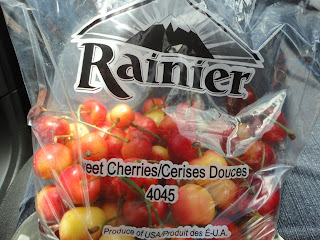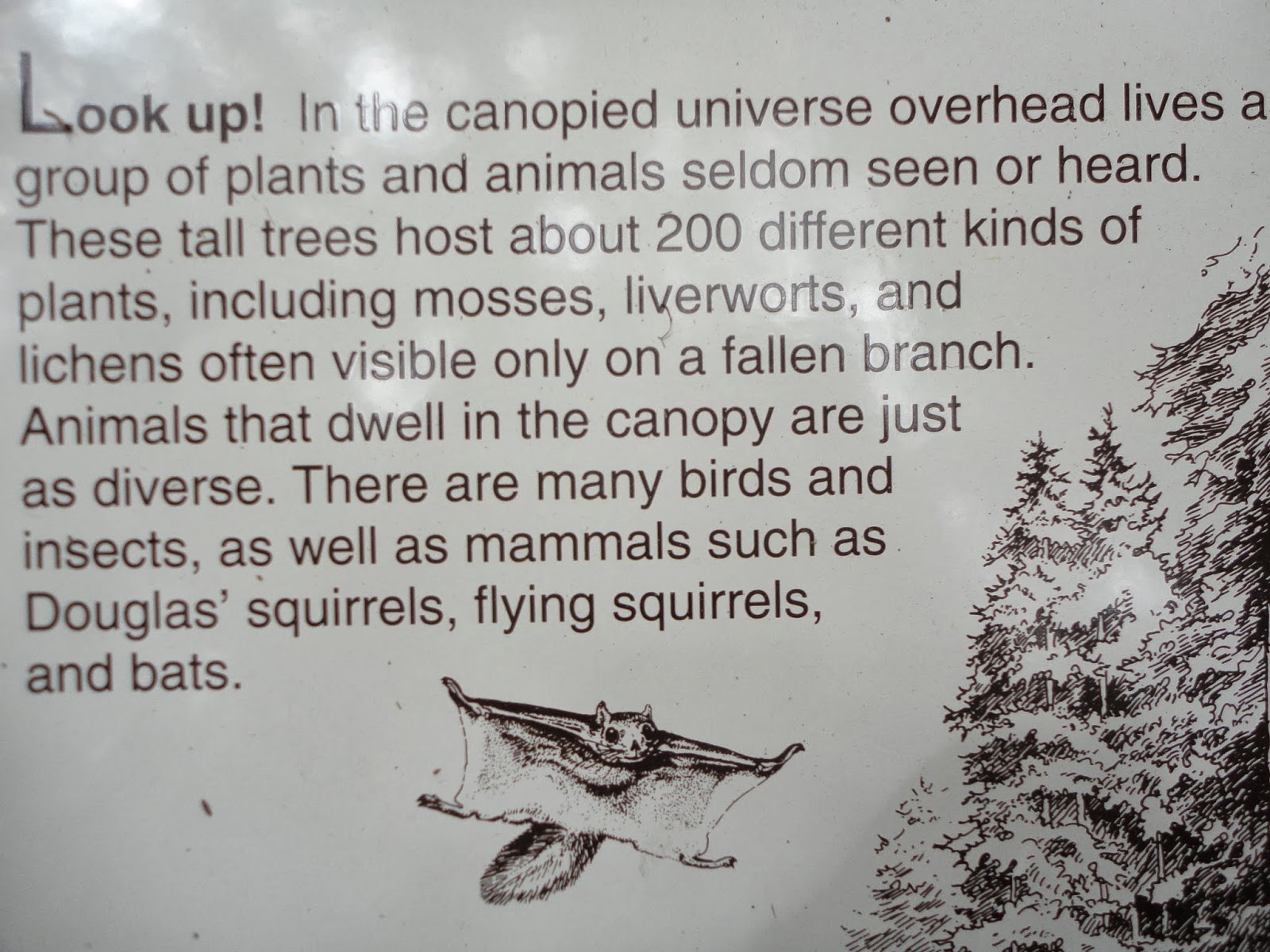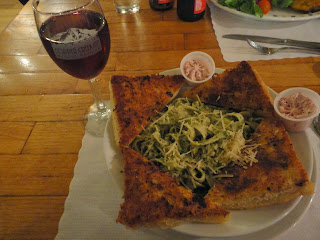There's something about the open road, and what you find along the way. Things that just tug at the soul, are so simple and feel so satisfying. Like...
Farm stands, selling nature's seasonal bounty.
I'm not sure if it was partly psychological, but when I purchased Rainier cherries back in New Jersey, they didn't taste nearly as good as these ones in Washington state in June.
Post offices, like this one in La Grande, Washington. I hope these stand proudly and strongly in the age of internet communication.
Little independent roadside restaurants. Defying a world of chain restaurants, these establishments offer in their own little corners of the world what corporate ones lack: individuality and character. At a wine tasting on Bainbridge Island, we were told about Scaleburgers in Elbe on the way to Ashford.
Unfortunately, they didn't have any veggie burgers, so I ordered a burger with the works - hold the burger, and a blackberry shake.
Places of worship. The Elbe Church, constructed in 1906.
Little cabin in the woods. This we booked in advance: the Almost Paradise Lodging in Ashford. This is for couples only. We stayed in the Rainier Cabin, our splurge place at $150 a night but our favorite of the stay.
Breakfast baskets are ready in the room. The apple cider mix and hot cocoa came in handy for the campfire. There were pastries in the fridge which we packed with a thermos of coffee for a coffee klatch in the woods for our hikes.
There is society, where none intrudes,
By the deep sea, and music in its roar:
I love not man the less, but Nature more."
In the film, his sister Carine says, "He risked what could have been a relentlessly lonely path but found company in the characters of the books he loved from writers like Tolstoy, Jack London and Thoreau. He could summon their words to suit any occasion." I too love to carry my storytellers with me. Their words give me comfort.
One of their specialties, the comforting huckleberry pie a la mode.
Copper Creek restaurant provided a cozy environment on another rain soaked night.
Farm stands, selling nature's seasonal bounty.
I'm not sure if it was partly psychological, but when I purchased Rainier cherries back in New Jersey, they didn't taste nearly as good as these ones in Washington state in June.
Post offices, like this one in La Grande, Washington. I hope these stand proudly and strongly in the age of internet communication.
Little independent roadside restaurants. Defying a world of chain restaurants, these establishments offer in their own little corners of the world what corporate ones lack: individuality and character. At a wine tasting on Bainbridge Island, we were told about Scaleburgers in Elbe on the way to Ashford.
Unfortunately, they didn't have any veggie burgers, so I ordered a burger with the works - hold the burger, and a blackberry shake.
Places of worship. The Elbe Church, constructed in 1906.
Little cabin in the woods. This we booked in advance: the Almost Paradise Lodging in Ashford. This is for couples only. We stayed in the Rainier Cabin, our splurge place at $150 a night but our favorite of the stay.
We picked the smallest cabin but had plenty of room. I like a more snug feel, anyway. This had a private hot tub, thankfully covered as it rained much of our time here.
Breakfast baskets are ready in the room. The apple cider mix and hot cocoa came in handy for the campfire. There were pastries in the fridge which we packed with a thermos of coffee for a coffee klatch in the woods for our hikes.
Guests leave trinkets behind. One of my favorites was a saying from a fortune cookie, "Forget the lottery. You are lucky in love."
There was an old wagon behind our cabin and when I asked the owner about it, she said she picked it up from someone and didn't know its history. Everything has a story. So many stories are lost.
There are gas fireplaces in the room. I understand safety issues why establishments have them, but I don't care for them at all. There's nothing like a real wood fire like the one built behind our cabin.
We lost an old oak tree during Superstorm Sandy at our home in New Jersey. My husband Steve bought a log splitter on Craig's List and it's one of our most favorite activities to have a fire outside in a fire pit he got at an estate sale.
"I must say this now about that first fire. It was magic. Out of dead tinder and grass and sticks came a live warm light. It cracked and snapped and smoked and filled the woods with brightness. It lighted the trees and made them warm and friendly. It stood tall and bright and held back the night." - Jean Craighead George, My Side of the Mountain.
Small happiness as a child, and as an adult: toasting marshmallows over a fire.
Our reason for being in Ashford: visiting Mount Rainier National Park. Sipping on mint tea, I took a photo of this portrait of campfire stories, and made me long for a story. Could you tell a story about the old wagon? I don't have the calling of original storytelling, and think it's a true gift for those who do.
In her diary of her trip from South Dakota to Mansfield, Missouri in1894 that was published in "On the Way Home," Laura Ingalls Wilder, one of my favorite storytellers, said observing the beauty of the surroundings she was leaving behind, "We all stopped and looked back at the scene and I wished for an artist's hand or a poet's brain or even to be able to tell in good plain prose how beautiful it was." I feel at a loss for words too describing the landscapes on my journeys. Photographs help, but don't fully capture it. We didn't have views of Rainier itself, but were satiated with others.
Laura wrote, "What is it about water that always affects a person? I never see a great river or lake but I think how I would like to see a world made and watch it through all its changes." Of another landscape she wrote, "It is a drowsy country that makes you feel wide awake and alive but somehow contended."
Like Laura, I would love to see a world made, and feel wide awake and alive seeing these images. I capture them here to share with others but for my own memory too. These travel diaries I do, and this blog, keeps my story alive for me so it doesn't get lost like the forgotten wagon.
Eddie Vedder's haunting Into the Wild soundtrack was a storyteller on the journey, from the wonderful film that was made of the John Krakauer book about Chris McCandless' journey into the wilds of Alaska. There's much I can't relate to in his tragic story, but I can understand his need to follow a different path instead of the one of material gain - keeping up with the Joneses so to speak - and his connection with the natural world. I love the quote by Lord Byron the film starts with,
"There is a pleasure in the pathless woods,
There is a rapture on the lonely shore, There is society, where none intrudes,
By the deep sea, and music in its roar:
I love not man the less, but Nature more."
In the film, his sister Carine says, "He risked what could have been a relentlessly lonely path but found company in the characters of the books he loved from writers like Tolstoy, Jack London and Thoreau. He could summon their words to suit any occasion." I too love to carry my storytellers with me. Their words give me comfort.
Reminders to not just look around, but look up. Life is everywhere, thriving.
The giving tree.
Wild Berry. A Nepalese restaurant feels so fitting for this area.
Sherpa tea (like a chai) with a vegetarian feast. Chickpeas are a hearty, inexpensive protein substitute for meat. So many can't picture a life without meat. I can't picture a life for me with it.
One of their specialties, the comforting huckleberry pie a la mode.
Copper Creek restaurant provided a cozy environment on another rain soaked night.
Love the wood burning stove and the zen artwork in the background with the woman holding the tree in the forest. Life has been very chaotic and unexpected this year in a number of ways (more about this later, and why these travel diaries are so far behind), but plans are to still get a wood burning stove for our home like this one.
Blackberry wine and linguine with pesto sauce, and garlic bread. Even the butter is blackberry!
Blackberry pie a la mode.
I picked up some cards by local artists at Ashford Creek Pottery.
I often looked abroad for adventure in my twenties, but in my thirties realized I'd overlooked the United States. I can't wait for more adventures in this life, both domestic and international. There may be more armchair traveling at certain points, or we may have to be more frugal camping instead of cabins, but I'm so grateful for my memory banks of roads traveled.
"The core of man's spirit comes from new experiences." - Chris McCandless, Into the Wild, the film.
I've loved many places I've traveled. For some reason I always think of the Southwest journey to those haunting New Mexico desert landscapes, the mountain overpasses in Colorado, and the stunning parks of Utah. But I'm grateful to keep finding new landscapes to carve out places in my heart, like those along the Carbon River.
The cycle of life in the rainforest.
A favorite road trip storyteller is always Scarlet's Walk from Tori Amos. Here in "Carbon" she seems to be figuring out a mystery, consulting real life writer friend Neil Gaiman asking him to read his short story Snow Glass Apples where nothing is what it seems. Stories help me figure out my journey too, as do friends, family, and travel. I love this quote from the actress Lillian Rodriguez from her travels to Carmel, California, "The more people you meet, things you touch and places you go, the more ideas you have for what you want your life to be and the larger it becomes."


















































































